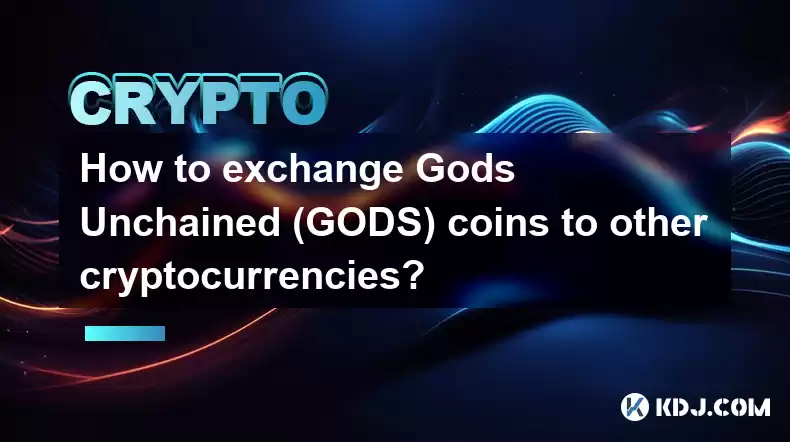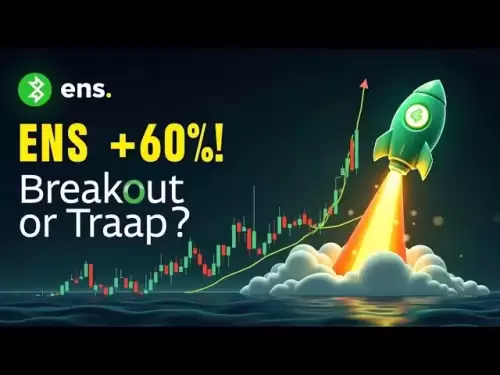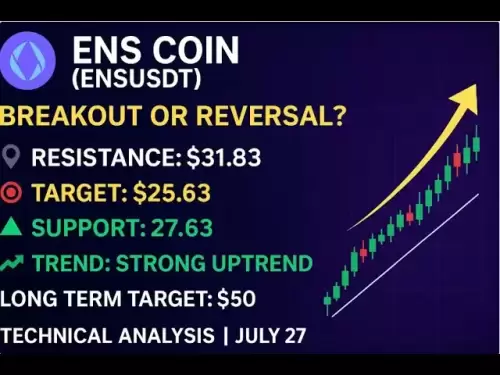-
 Bitcoin
Bitcoin $117900
0.31% -
 Ethereum
Ethereum $3766
0.28% -
 XRP
XRP $3.176
-0.31% -
 Tether USDt
Tether USDt $1.000
0.00% -
 BNB
BNB $795.6
1.51% -
 Solana
Solana $186.8
-1.09% -
 USDC
USDC $0.9999
-0.01% -
 Dogecoin
Dogecoin $0.2353
-1.33% -
 TRON
TRON $0.3226
1.49% -
 Cardano
Cardano $0.8172
-1.08% -
 Sui
Sui $4.178
3.06% -
 Hyperliquid
Hyperliquid $43.05
-3.39% -
 Stellar
Stellar $0.4367
-0.57% -
 Chainlink
Chainlink $18.62
1.47% -
 Hedera
Hedera $0.2828
6.63% -
 Bitcoin Cash
Bitcoin Cash $584.7
5.65% -
 Avalanche
Avalanche $24.81
2.53% -
 Litecoin
Litecoin $112.8
-0.88% -
 UNUS SED LEO
UNUS SED LEO $8.975
-0.08% -
 Shiba Inu
Shiba Inu $0.00001395
-1.07% -
 Toncoin
Toncoin $3.285
-1.05% -
 Ethena USDe
Ethena USDe $1.001
0.01% -
 Polkadot
Polkadot $4.123
0.76% -
 Uniswap
Uniswap $10.49
-0.18% -
 Monero
Monero $326.5
0.14% -
 Dai
Dai $0.9999
-0.02% -
 Bitget Token
Bitget Token $4.576
0.34% -
 Pepe
Pepe $0.00001247
-1.55% -
 Cronos
Cronos $0.1400
3.77% -
 Aave
Aave $295.1
-0.73%
How to exchange Gods Unchained (GODS) coins to other cryptocurrencies?
For secure GODS trading, choose a reputable exchange like Binance or Coinbase, complete account verification, fund with fiat or cryptocurrency, and withdraw GODS to a supported wallet or exchange.
Dec 23, 2024 at 09:12 pm

Key Points
- Understand the basics of cryptocurrency exchanges.
- Choose a reliable and secure exchange that supports GODS trading.
- Create an account on the exchange and complete the verification process.
- Fund your account with either fiat currency or cryptocurrency.
- Buy or sell GODS on the exchange by placing an order.
- Withdraw your GODS to a supported wallet or exchange.
How to Exchange GODS Coins to Other Cryptocurrencies
1. Understand Cryptocurrency Exchanges
Cryptocurrency exchanges are online platforms that facilitate the trading of cryptocurrencies. They act as intermediaries between buyers and sellers, providing a marketplace where traders can connect and execute their orders.
2. Choose a Reliable Exchange
Choosing a reputable exchange is crucial for ensuring the security of your funds. Consider factors such as:
- Security measures (e.g., two-factor authentication, SSL encryption)
- Supported cryptocurrencies (including GODS)
- Trading fees and liquidity
- User reviews and reputation
Binance, Coinbase, and Kraken are among the leading cryptocurrency exchanges that support GODS trading.
3. Create an Account and Verify Identity
Once you select an exchange, create an account by providing basic information such as your email address and password. Most exchanges require you to complete a verification process to comply with anti-money laundering (AML) and know-your-customer (KYC) regulations.
4. Fund Your Account
Before you can buy or sell GODS, you need to fund your exchange account. You can do this by transferring fiat currency (e.g., USD, EUR) or cryptocurrency from another wallet. Exchanges typically provide multiple funding options, such as bank transfers, credit/debit card payments, and cryptocurrency deposits.
5. Buy or Sell GODS
With your account funded, you can buy or sell GODS on the exchange. Find the GODS trading pair (e.g., GODS/USDT) and enter the amount you wish to trade. Choose the desired order type (e.g., market, limit, stop-loss) and click the "Buy" or "Sell" button.
6. Withdraw GODS
Once your order is executed, you can withdraw your GODS to a supported wallet or exchange. Navigate to the "Withdraw" section of the exchange, select GODS as the crypto to withdraw, and specify the recipient address and amount. The exchange will review your withdrawal request and initiate the transfer to the specified destination.
Frequently Asked Questions (FAQs)
Q: What is the best exchange for exchanging GODS coins?
A: The best exchange for trading GODS depends on your specific needs. Consider factors such as fees, liquidity, security, and supported features. Some of the leading exchanges that support GODS include Binance, Coinbase, and Kraken.
Q: Can I exchange GODS directly for fiat currency?
A: Yes, some exchanges allow you to exchange GODS directly for fiat currencies like USD or EUR. However, the availability of fiat trading pairs varies depending on the exchange.
Q: Are there any hidden fees involved in exchanging GODS?
A: Most exchanges charge trading fees, which vary depending on the platform and transaction amount. Some exchanges may also have additional fees for funding, withdrawals, or specific order types. It is important to review the exchange's fee schedule carefully before trading.
Disclaimer:info@kdj.com
The information provided is not trading advice. kdj.com does not assume any responsibility for any investments made based on the information provided in this article. Cryptocurrencies are highly volatile and it is highly recommended that you invest with caution after thorough research!
If you believe that the content used on this website infringes your copyright, please contact us immediately (info@kdj.com) and we will delete it promptly.
- Crypto ETFs and Altcoins: Navigating the Wild West with Meme Coins and Tokenized Assets
- 2025-07-27 23:04:06
- Bitcoin Price, Portfolio Growth, and the Remittix Alternative: Navigating the Crypto Landscape
- 2025-07-27 23:04:06
- Cryptos to Watch in 2025: Punisher Coin, Chainlink, and the Altcoin Arena
- 2025-07-27 18:30:13
- Bitcoin, Altcoins, Rebound: Navigating the Crypto Comeback Trail
- 2025-07-27 18:30:13
- Ethereum, Bitcoin, and Altcoins: A Shift in Crypto Tides?
- 2025-07-27 19:10:13
- Windtree Therapeutics' Bold BNB Strategy: A $520 Million Crypto Play
- 2025-07-27 19:10:13
Related knowledge

What is Chainlink (LINK)?
Jul 22,2025 at 02:14am
Understanding Chainlink (LINK): The Decentralized Oracle NetworkChainlink is a decentralized oracle network designed to bridge the gap between blockch...

What is Avalanche (AVAX)?
Jul 22,2025 at 08:35am
What is Avalanche (AVAX)?Avalanche (AVAX) is a decentralized, open-source blockchain platform designed to support high-performance decentralized appli...

What is Polkadot (DOT)?
Jul 19,2025 at 06:35pm
Understanding the Basics of Polkadot (DOT)Polkadot (DOT) is a multi-chain network protocol designed to enable different blockchains to transfer messag...

What is Litecoin (LTC)?
Jul 23,2025 at 11:35am
Overview of Litecoin (LTC)Litecoin (LTC) is a peer-to-peer cryptocurrency that was created in 2011 by Charlie Lee, a former Google engineer. It is oft...

What is Monero (XMR)?
Jul 21,2025 at 10:07am
What is Monero (XMR)?Monero (XMR) is a decentralized cryptocurrency designed to provide enhanced privacy and anonymity for its users. Unlike Bitcoin a...

How to add indicators to Ethereum chart on TradingView?
Jul 19,2025 at 07:15am
What Is an Ethereum Chart on TradingView?The Ethereum chart on TradingView is a visual representation of the price movement of Ethereum (ETH) over a s...

What is Chainlink (LINK)?
Jul 22,2025 at 02:14am
Understanding Chainlink (LINK): The Decentralized Oracle NetworkChainlink is a decentralized oracle network designed to bridge the gap between blockch...

What is Avalanche (AVAX)?
Jul 22,2025 at 08:35am
What is Avalanche (AVAX)?Avalanche (AVAX) is a decentralized, open-source blockchain platform designed to support high-performance decentralized appli...

What is Polkadot (DOT)?
Jul 19,2025 at 06:35pm
Understanding the Basics of Polkadot (DOT)Polkadot (DOT) is a multi-chain network protocol designed to enable different blockchains to transfer messag...

What is Litecoin (LTC)?
Jul 23,2025 at 11:35am
Overview of Litecoin (LTC)Litecoin (LTC) is a peer-to-peer cryptocurrency that was created in 2011 by Charlie Lee, a former Google engineer. It is oft...

What is Monero (XMR)?
Jul 21,2025 at 10:07am
What is Monero (XMR)?Monero (XMR) is a decentralized cryptocurrency designed to provide enhanced privacy and anonymity for its users. Unlike Bitcoin a...

How to add indicators to Ethereum chart on TradingView?
Jul 19,2025 at 07:15am
What Is an Ethereum Chart on TradingView?The Ethereum chart on TradingView is a visual representation of the price movement of Ethereum (ETH) over a s...
See all articles

























































































